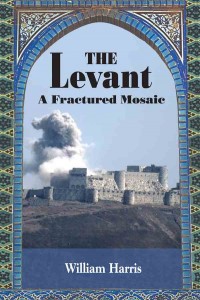One of the “10 Must-Read Books on the Evolution of Terrorism in the Middle East” — The Wall Street Journal
In the wake of the November terrorist attack in Paris, the Wall Street Journal asked several experts for book recommendations on the evolution of terrorism in the Middle East. This book was named as one of the top 10 books to read on the subject.
the Wall Street Journal asked several experts for book recommendations on the evolution of terrorism in the Middle East. This book was named as one of the top 10 books to read on the subject.
“William Harris’s comprehensive work is the best survey of the Levant region of the Middle East, a broad geographical area that today includes Syria, Lebanon, Israel, and parts of Jordan and Iraq, among other countries. … The book is a sweeping history of the region, explaining structural and geographic determinant factors that explain its role and characteristics throughout the ages. … It’s the single most useful book for understanding the Levant out there.”
— The Wall Street Journal
Perched between three continents — Africa, Asia, and Europe — the Levant is a crossroads of world history. Presently the domain of Lebanon, Syria, Israel, Jordan, and the Palestinians, with Turkey on its northern margins, the Levant epitomizes cultural complexity and geopolitical turbulence. This book surveys the pageant of peoples, armies, empires, and regimes that have featured in the Levant’s dramatic story since Pompey came from Rome chasing pirates more than 2,000 years ago.
This completely revised 2015 edition includes a special chapter on the convulsion in Syria since 2011, which has made the largest country in the Levant a theater of horror.
Other updated chapters include the latest events in Israel/Palestine (including the recent Gaza War), Jordan, Lebanon, and Turkey, an overview of ISIS, and the United States’ new role.
Reviews of earlier editions:
“Packed with solid information about the complex reality of the Levant in its historical, geographical, and political aspects during the past two millennia. The survey is remarkably balanced in its depiction of ideologies and rivalries. … Highly recommended.”
— Choice, Outstanding Academic Book of the Year
“Harris goes beyond historical developments to examine the unique circumstances that have led to sociopolitical fault lines in the contemporary nation-states of the Levant. … A well-researched and engaging book.”
— Library Journal
